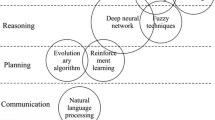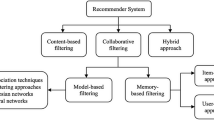Abstract
Recommender systems can improve the quality of life in smart cities by presenting personalized services to the community. Such systems maintain a database of user profiles for producing recommendations for a specific user. The collaborative filtering (CF) approach used in these systems has become a benchmark approach for generating recommendations for interested users because it can provide “out of the box” solutions. These CF-based approaches first construct a user–item rating matrix and then exploit similarity methods. These approaches suffer from scalability, sparsity, and cold user conditions, which consequently result in the poor recommendation accuracy of these systems. To enhance the accuracy of recommender systems, social trust can play a vital role because people tend to interact with a system or respond positively to recommendations that originate from their social trustworthy friends. The proposed unified approach of this article uses explicit trust, implicit trust, and user preference similarity to create a unified rating profile for the target user to produce more powerful and accurate recommendations. The proposed unified approach also enhances the recommendation performance of CF-based recommender systems when only a limited set of ratings is available. Experiments are performed on three publicly available datasets which are FilmTrust, CiaoDVD, and Epinions. Comparison of obtained results is made with traditional similarity measures as well as up-to-date trust-based approaches. The results show that the proposed unified approach is superior to existing approaches in terms of both predictive and classification-based accuracy measures.









Similar content being viewed by others
References
Ahmadian P (2015) A reliability-based recommendation method to improve trust-aware recommender systems. Expert Syst Appl 42:7386–7398
Alkhammash EH, Jussila J, Lytras MD, Visvizi A (2019) Annotation of smart cities twitter micro-contents for enhanced citizen’s engagement. IEEE Access 7:116267–116276
Ar Y, Bostanci E (2016) A genetic algorithm solution to the collaborative filtering problem. Expert Syst Appl 61:122–128
Avesani PMAP (2007) Trust-aware recommender systems. In: Proceedings of the 2007 ACM conference on recommender systems, RecSys, 2007, pp 17–24
Avesani P, Paolo M, Roberto T (2005) Moleskiing. It: a trust-aware recommender system for ski mountaineering. Int J Infonomics 20:1–10
Ayub M, Ghazanfar MA, Mehmood Z, Saba T, Alharbey R, Munshi AM, Alrige MA (2019) Modeling user rating preference behavior to improve the performance of the collaborative filtering based recommender systems. PLoS ONE 14(8):e0220129
Azadjalal MM, Moradi P, Abdollahpouri A, Jalili M (2017) A trust-aware recommendation method based on Pareto dominance and confidence concepts. Knowl Based Syst 116:130–143
Choudhary N, Bharadwaj K (2019) Leveraging trust behaviour of users for group recommender systems in social networks. In: Integrated intelligent computing, communication and security, 2019, pp 41–47. Springer
Chowdhury M, Thomo A, Wadge WW Trust-based infinitesimals for enhanced collaborative filtering. In: COMAD, 2009
Deng S, Huang L, Xu G (2014) Social network-based service recommendation with trust enhancement. Expert Syst Appl 41(18):8075–8084
Golbeck J (2005) Personalizing applications through integration of inferred trust values in semantic web-based social networks.In: Semantic network analysis workshop at the 4th international semantic web conference, vol 16, 2005
Golbeck J, Hendler J (2006) Filmtrust: movie recommendations using trust in web-based social networks. In: Proceedings of the IEEE consumer communications and networking conference, 2006. Citeseer
Guha R, Kumar R, Raghavan P, Tomkins A (2004) Propagation of trust and distrust. In: Proceedings of ACM international conference on world wide web, 2004, pp 403–412
Guo GAZJ, Yorke-Smith N (2013) A novel Bayesian similarity measure for recommender systems. In: Proceedings of the 23rd international joint conference on artificial intelligence (IJCAI), pp 2619–2625
Guo G, Zhang J, Thalmann D (2012) A simple but effective method to incorporate trusted neighbors in recommender systems. In: International conference on user modeling, adaptation, and personalization, 2012. Springer
Guo G, Zhang J, Thalmann D, Yorke-Smith N (2014) Etaf: an extended trust antecedents framework for trust prediction. In: Proceedings of the 2014 IEEE/ACM international conference on advances in social networks analysis and mining, 2014. IEEE Press
Guo G, Zhang J, Thalmann D (2014b) Merging trust in collaborative filtering to alleviate data sparsity and cold start. Knowl Based Syst 57:57–68
Guo G, Zhang J, Thalmann D, Basu A, Yorke-Smith N (2014) From ratings to trust: an empirical study of implicit trust in recommender systems. In: Proceedings of the 29th annual acm symposium on applied computing, 2014. ACM
Guo G, Zhang J, Yorke-Smith N (2015) TrustSVD: collaborative filtering with both the explicit and implicit influence of user trust and of item ratings. In 29th AAAI conference on artificial intelligence, 2015
Gupta S, Nagpal S (2015) Trust aware recommender systems: a survey on implicit trust generation techniques. Int J Comput Sci Inf Technol 6(4):3594–3599
He X, Liu B, Chen K (2018) ITrace: an implicit trust inference method for trust-aware collaborative filtering. In: AIP conference proceedings, 2018. AIP Publishing
Hwang C-S, Chen Y-P (200) Using trust in collaborative filtering recommendation. In: International conference on industrial, engineering and other applications of applied intelligent systems, 2007. Springer
Jamali M, Ester M Trustwalker: a random walk model for combining trust-based and item-based recommendation. In: Proceedings of the 15th ACM SIGKDD international conference on Knowledge discovery and data mining, 2009. ACM
Jamali M, Martin E (2009) Trustwalker: a random walk model for combining trust-based and item-based recommendation. In: Proceedings of the 15th ACM SIGKDD international conference on Knowledge discovery and data mining, 2009. ACM
Jeong B, Lee J, Cho H (2009) User credit-based collaborative filtering. Expert Syst Appl 36(3):7309–7312
Kant V, Bharadwaj KK (2013) Fuzzy computational models of trust and distrust for enhanced recommendations. Int J Intell Syst 28(4):332–365
Katarya R, Verma OP (2016) A collaborative recommender system enhanced with particle swarm optimization technique. Multimed Tools Appl 75(15):9225–9239
Lathia N, Hailes S, Capra L Trust-based collaborative filtering. In IFIP international conference on trust management, 2008. Springer
Lee W-P, Ma C-Y (2016) Enhancing collaborative recommendation performance by combining user preference and trust-distrust propagation in social networks. Knowl Based Syst 106:125–134
Li Y-M, Kao C-P (2009) TREPPS: a trust-based recommender system for peer production services. Expert Syst Appl 36(2):3263–3277
Li Y-M, Wu C-T, Lai C-Y (2013) A social recommender mechanism for e-commerce: combining similarity, trust, and relationship. Decis Support Syst 55(3):740–752
Liu F, Lee HJ (2010) Use of social network information to enhance collaborative filtering performance. Expert Syst Appl 37(7):4772–4778
Lu QSAJ (2012) A trust-semantic fusion-based recommendation approach for e-business applications. Decis Support Syst 54:768–780
Lytras M, Visvizi A (2018) Who uses smart city services and what to make of it: toward interdisciplinary smart cities research. Sustainability 10(6):1998
Lytras M, Visvizi A, Daniela L, Sarirete A, Ordonez De Pablos P (2018) Social networks research for sustainable smart education. Sustainability 10(9):2974
Massa P, Avesani P (2004) Trust-aware collaborative filtering for recommender systems. In: OTM confederated international conferences “on the move to meaningful internet systems”, 2004. Springer
Mehmood Z, Rashid M, Rehman A, Saba T, Dawood H, Dawood H (2018) Effect of complementary visual words versus complementary features on clustering for effective content-based image search. J Intell Fuzzy Syst 1–4. (preprint)
Mehmood Z, Gul N, Altaf M, Mahmood T, Saba T, Rehman A, Mahmood MT (2018b) Scene search based on the adapted triangular regions and soft clustering to improve the effectiveness of the visual-bag-of-words model. EURASIP J Image Video Process 2018(1):48
Mesas RM, Bellogín A (2018) Exploiting recommendation confidence in decision-aware recommender systems. J Intell Inf Syst 1–34
O’Donovan J, Smyth B (2005) Trust in recommender systems. In Proceedings of the 10th international conference on Intelligent user interfaces, 2005. ACM
Papagelis M, Plexousakis D, Kutsuras T Alleviating the sparsity problem of collaborative filtering using trust inferences. In: International conference on trust management, 2005. Springer
Parvin H, Moradi P, Esmaeili S (2019) TCFACO: trust-aware collaborative filtering method based on ant colony optimization. Expert Syst Appl 118:152–168
Qazi KA, Nawaz T, Mehmood Z, Rashid M, Habib HA (2018) A hybrid technique for speech segregation and classification using a sophisticated deep neural network. PLoS ONE 13(3):e0194151
Ravi L, Subramaniyaswamy V, Vijayakumar V, Chen S, Karmel A, Devarajan M (2019) Hybrid location-based recommender system for mobility and travel planning. Mobile Netw Appl 24:1–14
Ray S, Ambuj M (2010) Improving prediction accuracy in trust-aware recommender systems. In: 2010 43rd Hawaii international conference on system sciences (HICSS), 2010. IEEE
Ray S, Mahanti A (2010) Improving prediction accuracy in trust-aware recommender systems. In: 2010 43rd Hawaii international conference on system sciences, 2010. IEEE
Richardson PSAM (2008) Yes, there is a correlation: from social networks to personal behavior on the web. In: Proceedings of the 17th international conference on world wide web, WWW, 2008, pp 655–664
Sarwar A, Mehmood Z, Saba T, Qazi KA, Adnan A, Jamal H (2019) A novel method for content-based image retrieval to improve the effectiveness of the bag-of-words model using a support vector machine. J Inf Sci 45(1):117–135
Sharif U, Mehmood Z, Mahmood T, Javid MA, Rehman A, Saba T (2019) Scene analysis and search using local features and support vector machine for effective content-based image retrieval. Artif Intell Rev 52(2):901–925
Sumathi G, Sendhilkumar S, Mahalakshmi G (2016) Hybrid recommendation system using particle swarm optimization and user access based ranking. In: Proceedings of the international conference on informatics and analytics. ACM
Visvizi A, Lytras MD (2018) Rescaling and refocusing smart cities research: from mega cities to smart villages. J Sci Technol Policy Manag 9(2):134–145
Visvizi A, Lytras MD, Damiani E, Mathkour H (2018) Policy making for smart cities: innovation and social inclusive economic growth for sustainability. J Sci Technol Policy Manag 9(2):126–133
Visvizi A, Jussila J, Lytras MD, Ijäs M (2019) Tweeting and mining OECD-related microcontent in the post-truth era: A cloud-based app. Comput Hum Behav
Baig F, Mehmood Z, Rashid M, Javid MA, Rehman A, Saba T, Adnan A (XXXX) Boosting the performance of the BoVW model using SURF–CoHOG-based sparse features with relevance feedback for CBIR. Iran J Sci Technol Trans Electr Eng 1–20
Yadav S, Kumar V, Sinha S, Nagpal S (2018) Trust aware recommender system using swarm intelligence. J Comput Sci 28:180–192
Yuan W, Shu L, Chao H-C, Guan D, Lee Y-K, Lee S (2010) ITARS: trust-aware recommender system using implicit trust networks. IET Commun 4(14):1709–1721
Zhang F, Lee VE, Jin R, Garg S, Choo K-KR, Maasberg M et al (2019) Privacy-aware smart city: a case study in collaborative filtering recommender systems. J Parallel Distrib Comput 127:145–159
Ziegler C-N, Golbeck J (2015) Models for trust inference in social networks. In: Propagation phenomena in real world networks, 2015,pp 53–89. Springer
Funding
This article contains no funding information, as it is not funded by any source/agency.
Author information
Authors and Affiliations
Corresponding author
Ethics declarations
Conflicts of interest
The authors declare that they have no conflicts of interest.
Ethical standard
This article does not contain any studies involving animals performed by any of the authors. This article does not contain any studies involving human participants performed by any of the authors.
Additional information
Communicated by Miltiadis D. Lytras.
Publisher's Note
Springer Nature remains neutral with regard to jurisdictional claims in published maps and institutional affiliations.
Rights and permissions
About this article
Cite this article
Ayub, M., Ghazanfar, M.A., Mehmood, Z. et al. Unifying user similarity and social trust to generate powerful recommendations for smart cities using collaborating filtering-based recommender systems. Soft Comput 24, 11071–11094 (2020). https://doi.org/10.1007/s00500-019-04588-x
Published:
Issue Date:
DOI: https://doi.org/10.1007/s00500-019-04588-x




